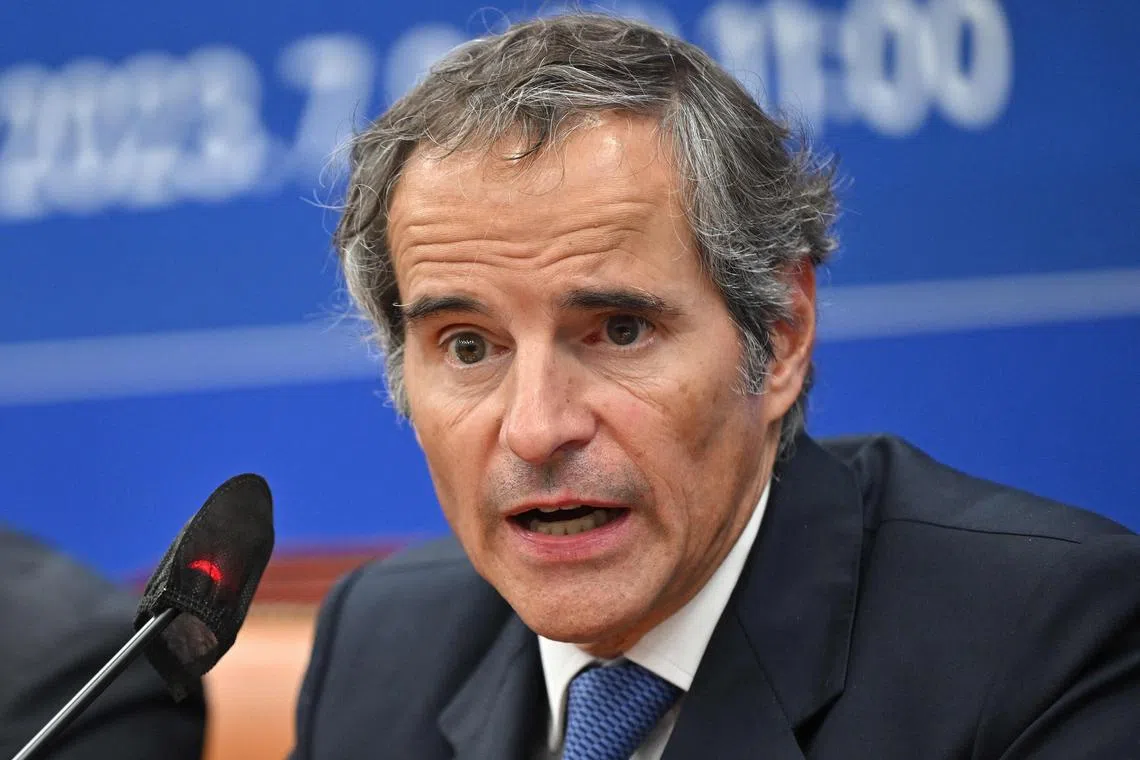IAEA chief Grossi says ‘absolutely logical’ Japan’s Fukushima water release draws interest
Sign up now: Get ST's newsletters delivered to your inbox

Mr Rafael Grossi was met with angry protests by civic groups as he arrived in South Korea last Friday.
AFP
Follow topic:
SEOUL - It is “absolutely logical” that Japan’s plan to release treated water from its Fukushima nuclear plant
Mr Grossi also said he understands concerns remain over the plan, but added that a review by the IAEA released last week found it was “in conformity with international safety standards” if executed according to plan.
The plan has raised concerns in neighbouring countries, prompting China to ban some food imports from Japan.
Mr Grossi met South Korea’s opposition Democratic Party members on Sunday who expressed strong public concerns over Japan’s plan and criticised the IAEA’s findings.
“The issue at hand today has attracted a lot of interest, and this is absolutely logical because the actions and the way in which Japan will be addressing this... have important implications,” Mr Grossi said in the meeting.
A Democratic Party member who chairs a special committee on the issue said the IAEA’s findings had “shortcomings”, and the widespread public concerns over safety in the country were “legitimate and reasonable”.
“We deeply regret that the IAEA concluded Japan’s plan to discharge contaminated water from the Fukushima nuclear power plant meets international standards,” Mr Wi Seong-gon, the committee’s chairman, told Mr Grossi.
Mr Grossi was met with angry protests by civic groups as he arrived in South Korea last Friday from Japan, and drew street rallies on Saturday criticising the plan.
South Korea’s government said last Friday that it respected the IAEA’s report and that its own analysis had found the release will not have “any meaningful impact” on its waters.
Chinese Foreign Ministry spokesman Wang Wenbin last Wednesday criticised the move to discharge the water. Two days later, on Friday, the Chinese government said it would tighten its scrutiny of food from Japan
North Korea also criticised the IAEA’s backing of Japan’s plan, calling it “unjust” and a demonstration of double standards, citing the United Nations nuclear watchdog’s work to curb Pyongyang’s nuclear programme.
The release of the treated water will have a “fatal adverse impact on the human lives and security and ecological environment”, an official from Pyongyang’s Environmental Protection Ministry said in a statement carried by the official Korean Central News Agency.
“What matters is the unreasonable behaviour of IAEA actively patronising and facilitating Japan’s projected discharge of nuclear-polluted water, which is unimaginable,” the statement added.
North Korea has faced UN Security Council sanctions for its six underground nuclear tests.
Some 1.33 million cubic metres of groundwater, rainwater and water used for cooling have accumulated at the Fukushima nuclear plant, where several reactors went into meltdown after the 2011 tsunami overwhelmed cooling systems.
The plant operator will treat the water to remove almost all radioactive elements except tritium, and plans to dilute it before discharging it into the ocean over several decades. REUTERS

